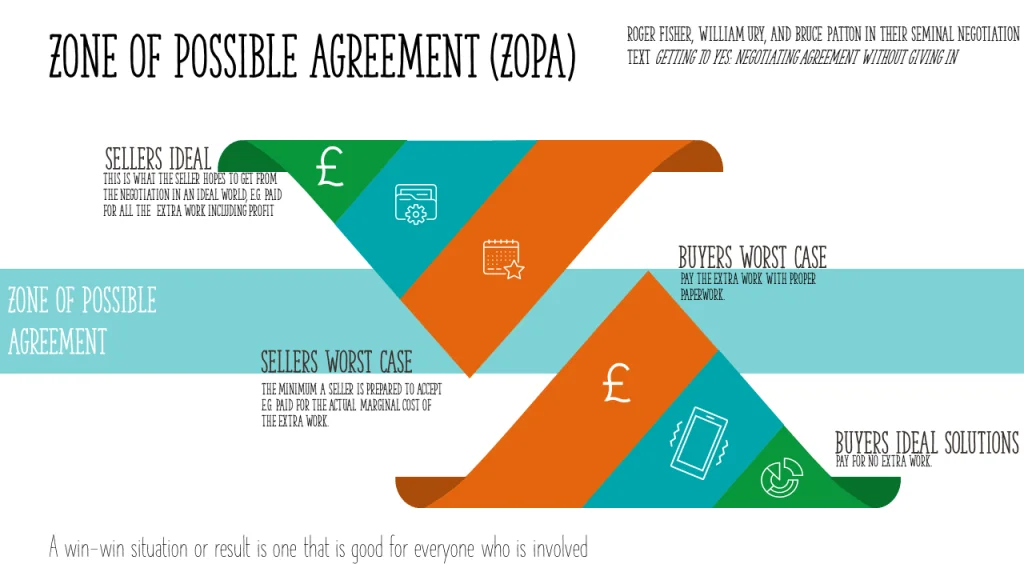The new version of the Association for Project Management Project Management Qualification (APM PMQ) based on the 7th Edition of the Body of Knowlege introduced some new negotiation concepts. These are Zone of Possible Agreement (ZOPA), Best Alternative to a Negotiated Agreement (BATNA) and Win-Win. In this blog post, we briefly explain these terms and their relevance to project management and the APM PMQ exam.
Where do these terms come from?
These three terms come from the seminal book on negotiations Fisher, Roger and William Ury. Getting to Yes: Negotiating Agreement Without Giving In, 3rd ed. New York, NY: Penguin Books, 2011. You can read a summary of this book here Summary of “Getting to Yes: Negotiating Agreement Without Giving In” | Beyond Intractability. Still, I strongly recommend reading the full text; it’s a concise but informative book. The book’s main theme is about understanding what each party wants from the negotiation and then negotiating around the issues, not the people and emotion. In summary, they discuss
- Separate the people from the problem.
- Focus on interests, not positions.
- Learn to manage emotions.
- Express appreciation.
- Put a positive spin on your message.
- Escape the cycle of action and reaction.
Three terms are introduced, almost in passing are ZOPA, BATNA and Win-Win and these have been co-opted into the syllabus for the APM PMQ. In this post, we explain these three terms, without explaining the whole book.
ZOPA

The possible agreement zone represents the overlap between what the seller and buyer are willing to accept. Each will have a best-case and a worst-case outcome from the negotiation. The region in which they overlap is the zone of possible agreement. Say, for example, negotiating a claim for additional costs with a customer as part of closing out a contract. Let say the situation is:
| Sellers Ideal | Ideally, get paid £1m for all the changes and extra work, including profits. |
| Sellers Worst Case | Accept a minimum payment £400k for most of the changes at marginal cost (no profit) |
| Buyers Ideal | Pay not one penny extra, £0 |
| Buyers Worst Case | Pay a maximum for the approved change requests at contractual rates up to £500k. |
Here you can see we have a possible agreement zone between £400k, which is the minimum the seller is willing to accept, and £500k the maximum the buyer is willing to pay. It will help if you read getting to Yes to understand ways of reaching agreement without compromising relationships.
Win-Win
By win-win, they mean finding options that provide mutual gain for the different parties. A solution that gives all parties what they want, in so far as possible. The way to achieve win-win is to identify what the other party wants, which you can easily offer. In return, ask for something important for you, but easy for the other person to offer. For example
If we can agree to take on these changes at cost today then we will make the payment in the next 10 days.
We are exchanging something important to us “agreement to the changes” in exchange for something important to the other side. To do this, we need to understand what is important for them and us.
Win-Win compares to lose-lose where each side compromises and feels they have not got what they should have done. Or even worse where one side wins, and the other side loses.
Win-win may not always be possible, especially for short term transactions, buying a car or shopping in a supermarket. However, it should be possible to find a solution beneficial to both sides in longer-term contractual arrangments.
Best Alternative To A Negotiated Agreement (BATNA)

Sometimes the zone for potential agreement gets so small that the seller and buyer cannot reach an agreement. So what do we do now? If the sellers worst-case and buyers worst case don’t overlap, we will not reach an agreement.
| Sellers Ideal | Ideally, get paid £1m for all the changes and extra work, including profits. |
| Sellers Worst Case | Pay a minimum of £450k for most of the changes at marginal cost (no profit) |
| Buyers Ideal | Pay not one penny extra, £0 |
| Buyers Worst Case | Pay a maximum for the approved change requests at contractual rates up to £400k. |
In this case, we have no overlap between the £450k demanded by the seller and the £400k the buyer is willing to pay. We could spend all day in the room, but this negotiation will not reach an agreement. This is where we need a fallback plan, a Best Alternative to a Negotiated Agreement (BATNA). Ideally, we agree on this BATNA with Senior Management (and the Sponsor) before we start the negotiation. For example
If we can’t agree this payment by the end of the week then we will have to take this to formal arbitration.
We should really agree on this BATNA with Senior Management (and the Sponsor) before we enter the negotiation room; otherwise, we run the risk of being unable to follow through on our plan and having to walk back into the negotiation with a significantly weakened position.